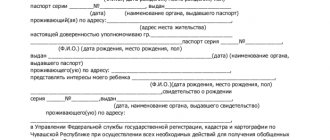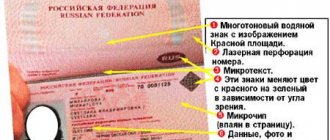⭐ ⭐ ⭐ ⭐ ⭐ Good afternoon, readers of my blog, now we will comprehend the necessary topic for everyone - the Identity Document of the Child Representative. What is it. Perhaps you may still have questions after you read, so it is best to ask them in the comments below, or even better - get advice from practicing lawyers on all types of law from our partners.
We constantly update information and monitor its updates, so you can be sure that you are reading the latest edition.
3. Powers of attorney for military personnel, and at points of deployment of military units, formations, institutions and military educational institutions, where there are no notary offices and other bodies performing notarial acts, also powers of attorney for employees, members of their families and family members of military personnel, which are certified by the commander (chief ) these units, formations, institutions or establishments;
Children left without parental care, before being transferred to a family for upbringing (adoption), under guardianship or trusteeship, in a foster family or in cases provided for by the laws of the constituent entities of the Russian Federation, in a foster family), and in the absence of such an opportunity in the organization for orphans and children left without parental care
Healthy
Minors and incompetent citizens who are under guardianship or trusteeship, if the actions of guardians or trustees to represent the legitimate interests of the wards are contrary to the legislation of the Russian Federation and (or) the legislation of the constituent entities of the Russian Federation or the interests of the wards, or if the guardians or trustees do not protect the legitimate interests of the wards
When applying for state registration of rights and transactions with real estate objects, an application and other necessary documents on behalf of minors under the age of 14 are submitted by their legal representatives, and they also sign contracts. If the child is between 14 and 18 years old, then he signs the contract, submits an application for state registration of rights and documents for registration - independently.
A document confirming the authority of the child applicant’s representative
The powers of the legal representative of a body, enterprise, institution, organization, acting on the basis of the powers granted to him by law, charter, regulation or other constituent document, are confirmed by documents certifying his official position and authority to act on behalf of this entity. At the same time, the Extract from the Unified State Register of Legal Entities must be valid (30 days from the date of issue) and not abbreviated (it must reflect the information of the identity document of the head/manager). A document confirming the powers of the legal representative, what is it? In cases where representation arises due to circumstances directly established by law, it is called legal representation. Legal representatives are parents, adoptive parents and guardians of minors, as well as guardians of persons declared incompetent by the court (Articles 26, 28, 32 of the Civil Code of the Russian Federation).
Who can become a legal representative of an individual
If a citizen cannot independently represent his interests in authorities and government agencies, then he must appoint a legal representative who will deal with these issues.
He will act on behalf of the individual
:
- in ordinary life situations, if a citizen is completely or partially incapacitated;
- exercise the rights of a representative in court;
- in educational institutions;
- at meetings and councils;
- in government agencies.
Most often, a civil representative is required to represent interests in the first two cases.
Incompetent persons also include minor citizens. Their legal representatives are their parents. Upon reaching the age of majority, the need for representation and protection of rights disappears and these persons cease to need representation.
If the child does not have parents, then his rights will be represented and protected by his grandparents, and in their absence by his adoptive family or guardians. If a minor does not have any relatives, then he remains in the care of the state and it is the state that is his legal representative.
In some cases, a capable citizen also needs a representative. In court, this role is performed by a lawyer. He also has the right to appoint someone whom he trusts to protect and defend his interests. This appointment must be made through a notary office.
Please note that an uncertified power of attorney has no legal force.
Register now and get a free consultation from Specialists
Menu
SNILS) (submitted at the initiative of the applicant)
- a document confirming that the child’s parents have not received unemployment benefits
- information about his failure to receive monthly child benefits (submitted at the initiative of the applicant)
- a document confirming the termination of payment of monthly benefits at the previous place of residence (for citizens arriving from other regions) (submitted at the initiative of the applicant)
- a document indicating a personal account opened with Sberbank (or Sberbank).
A document confirming the authority of the legal representative of the parent
The number of deputy heads of the Service is established by the Government of the Russian Federation. Financing of expenses for the maintenance of the central apparatus of the Federal Service for State Registration, Cadastre and Cartography and its territorial bodies is carried out within the limits of budgetary allocations provided for in the federal budget. The Federal Service for State Registration, Cadastre and Cartography is a legal entity, has a seal with the image of the State Emblem of the Russian Federation and with its name, other seals, stamps and forms of the established form, as well as accounts opened in accordance with the legislation of the Russian Federation.
Who is the legal representative of a minor?
If you want to find out how to solve your particular problem, please use the online consultant form on the right or call. It's fast and free! Content:
- Basic Concepts
- Who is eligible?
- General and simple form of document - what is the difference?
- Contents of the form and who writes it
- Sample
- What is the price?
- Extension of validity period
- Conclusion
Basic concepts If a person cannot, for some reason, independently represent his interests in court or other organizations, then he can transfer this right to other individuals or legal entities.
Documents required when submitting an application
The rules for issuing a power of attorney are published in the corresponding article on our website.
- cancellation of a power of attorney by any person if this document was issued jointly and collectively;
- death of the citizen who issued the power of attorney;
- recognition of the citizen who drew up or issued the power of attorney as incompetent, legally capable to a limited extent, or missing;
- Death of a citizen who received a power of attorney;
- recognition of the person who received the power of attorney as incapacitated, missing or recognized as having limited legal capacity;
- termination of the legal entity on whose behalf the document was drawn up or in whose name it was issued;
- reorganization of a legal entity that received or issued a power of attorney, with its further division, merger with another entity or merger.
Document confirming the authority of the child's representative
The interests of citizens declared incompetent are represented in court proceedings by their legal representatives.
These may be parents, guardians, adoptive parents and other persons who are vested with the appropriate powers by federal legislation.
Representatives of copyright holders or participants in transactions, in particular, are: · heads of legal entities; · legal representatives of minors under 14 years of age; · guardians of incapacitated citizens; · representatives by virtue of powers based on acts of state power or local government; · representatives of individuals and legal entities by virtue of powers based on a power of attorney or agreement.
A power of attorney drawn up abroad must be apostilled or legalized by the Department of Consular Service of the Russian Ministry of Foreign Affairs.
3 tbsp. 55, paragraph 3 of Art.
InfoFamily Code of the Russian Federation, children left without parents, who do not have guardians and trustees, who went to study in an organization for orphans, must be under the guardianship of the guardianship authorities. The duties of a guardian are temporarily assigned to this body.
In the case where a child has entered a technical school, lives in a technical school dormitory, and the educational institution specializes in raising orphans, then it will be the legal representative of the child. Legal representative for a child entering a university, college, technical school When a child enters an educational organization, a representative of a minor must submit an application on his own behalf, as well as present a document proving his identity.
This procedure is established by the provisions of Art. 49 SK. Guardianship and guardianship The procedure for their establishment is regulated by Articles 31-41 of the Family Code.
Documents certifying the powers of legal representatives
Code may be temporarily assigned to the guardianship and trusteeship authority. Fulfilling the duties of guardians (trustees) of children under full state care in educational institutions, medical institutions, social welfare institutions and other similar institutions is assigned to the administration of these institutions (clause 1 of Article 147 of the Family Code of the Russian Federation). On behalf of legal entities, applications for state registration can be submitted by persons acting in accordance with the law, other legal acts and constituent documents, without a power of attorney (clause 1 of Article 53 of the Code); representatives by virtue of powers based on a power of attorney or agreement (Articles 182, 184 of the Code). In case of disagreements between parents and children, the guardianship and trusteeship authority is obliged to appoint a representative to protect the rights and interests of children (Part 1 of Article 64). Thus, you, as a parent, are the legal representative of your minor child by birth.
Search
When do the rights and obligations of a legal representative cease? The child is independently responsible for his actions, speaks on his own behalf in various authorities without the support of a legal representative in the following cases:
- If he has already reached the age of majority, he is 18 years old.
- If a minor has entered into a marriage (got married).
The law of the Russian Federation provides for a limited list of persons who can act as legal representatives of a minor child: parents, guardians, trustees, adoptive parents. They are entrusted with the rights and responsibilities for the upbringing and education of children.
On the rights of a legal representative of a minor
You can consider what rights a legal representative has using the example of the participation of a minor in criminal proceedings. A citizen can:
- attend interrogations;
- monitor compliance with the rights of persons under 18 years of age;
- attend meetings and hearings;
- understand and explain to the child what he is accused of;
- submit challenges and petitions in a timely manner;
- receive notifications and become familiar with them;
- hire a lawyer and cooperate with a lawyer;
- sign documents on behalf of the child.
Read also: Deprivation of parental rights and collection of alimony
The legal process involving a minor and a guardian has a number of complexities.
On the rights of a legal representative of a minor
Popular:
Representatives of copyright holders or participants in transactions, in particular, are: heads of legal entities; legal representatives of minors under 14 years of age; guardians of incapacitated citizens; representatives by virtue of powers based on acts of state power or local government; representatives by virtue of powers based on a power of attorney or agreement; notaries who certified the transaction or performed another notarial act on the basis of which the right to real estate arises (clause
Who is the legal representative of a minor?
The powers of the legal representative of an individual are certified by a child’s birth certificate, a decision to appoint a person as a guardian, trustee or other documents that unconditionally confirm the connection by virtue of which the person is the legal representative of the person participating in the case. 4.
Legal consultation
ImportantWho is the legal representative of a minor in criminal proceedings? According to Art. 48 of the Criminal Code of the Russian Federation in criminal cases committed by minors, the child’s legal representatives are involved in participation in the criminal case. These may be parents, guardians, trustees or adoptive parents. The legal representatives of a child accused of a criminal act are allowed to participate in the criminal process based on the decision of the investigator. The child’s representative is obliged to attend meetings, participate in the interrogation of the accused, in the trial (to get acquainted with the case materials, bring complaints, petition, challenge, provide evidence, etc.).
Who is the legal representative of a minor in criminal proceedings?
According to Part 1 of Art. 20 of the Criminal Code, criminal liability is imposed on a person who has reached 16 years of age at the time of the crime. In Part 2 of Art. 20 of the Criminal Code specifies the crimes for which citizens over the age of 14 are punished.
Read also: Punishment for non-payment of alimony
Based on Art. 48 of the Criminal Code of the Russian Federation, the legal representative for a child who has committed a crime is adoptive parents, guardians, parents and trustees. Only an investigator can attract these citizens to participate in criminal proceedings by order. The representative has the right to attend meetings and interrogations.
During the trial, he can familiarize himself with materials, draw up complaints and petitions, collect and provide evidence of the ward’s innocence of a criminal offense.
The minor's representative has the right
Features of actions during interrogations
Representatives of a minor in criminal proceedings are obliged to protect his interests and rights. During interrogations, responsible citizens have the following powers:
- receive information about the details and nuances of the case;
- present at the arraignment;
- study procedural acts and make adjustments on their own behalf;
- are close to the ward when he gives evidence;
- provide explanatory materials.
Only a court can remove a legal representative from participation in a case. The basis will be the person’s actions not aimed at protecting the child. The judicial authorities may appoint another representative for the accused.
Information
Consent to data processing
- management organization at the place of residence of the principal,
- the administration of the social protection institution in which the principal is located, as well as the inpatient medical institution in which the principal is undergoing treatment,
- the commander (chief) of the relevant military unit, formation, institution, military educational institution, if powers of attorney are issued by military personnel, employees of this unit, formation, institution, military educational institution or members of their families,
- the head of the relevant place of deprivation of liberty, if powers of attorney are issued by persons in places of deprivation of liberty.
A power of attorney on behalf of an organization is issued signed by its head or another person authorized to do so by its constituent documents, sealed with the seal of this organization.
About legal and authorized representatives
If a citizen cannot independently represent his interests in authorities and government agencies, then he must appoint a legal representative who will deal with these issues.
A legal representative is a person who, by virtue of the law (without a power of attorney), acts to protect the rights and legitimate interests of other citizens who are either incapacitated or have limited legal capacity, or who, due to their age or physical condition, cannot personally exercise their rights and obligations.
Incompetent persons also include minor citizens. Their legal representatives are their parents.
If the child does not have parents, then his rights will be represented and protected by his grandparents, and in their absence, by his adoptive family or guardians. If a minor does not have any relatives, then he remains in the care of the state, and it is the state that is his legal representative.
Documents are submitted that confirm legal representation: for the parent of a minor child - the child’s birth certificate and the parent’s passport; for a guardian or trustee - an act of the guardianship and trusteeship authority on the appointment of a guardian or trustee, a passport of the guardian or trustee.
An authorized representative of an individual may be another individual vested with the appropriate powers by that person. The basis of representation is a power of attorney. A power of attorney for an authorized representative of an individual to represent his interests must be notarized.
A power of attorney is a transaction of a legal nature. It specifies the rights, duties and powers of the representative to carry out certain actions, as well as the circle of authorities in which it will act.
The following are equivalent to notarized powers of attorney: powers of attorney of military personnel and persons undergoing treatment in hospitals, sanatoriums and other military medical institutions, which are certified by the head of such an institution, his deputy for medical affairs; powers of attorney of military personnel and members of their families, which are certified by the commander (chief) of the unit, formation, institution or establishment; powers of attorney of persons in places of deprivation of liberty, which are certified by the head of the corresponding place of deprivation of liberty; powers of attorney of adult capable citizens located in institutions for social protection of the population, which are certified by the administration of this institution or the head (his deputy) of the relevant body of social protection of the population.
The power of attorney can be unlimited. This point should be spelled out in it. If this entry is missing in the document, then its validity period is 1 (one) year from the date of signing.
Doctor-methodologist of the organizational and methodological department of the Federal State Institution “GB ITU for the Omsk Region” of the Ministry of Labor of Russia Nedosekova I.V.
As an advertisement







